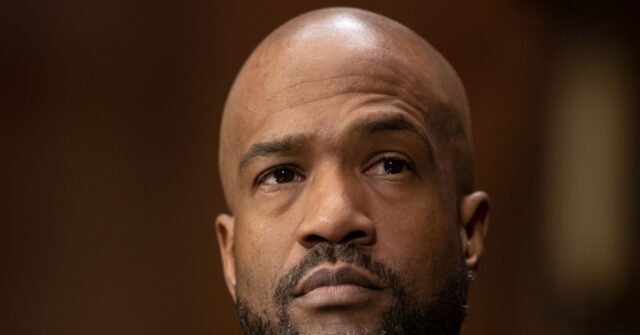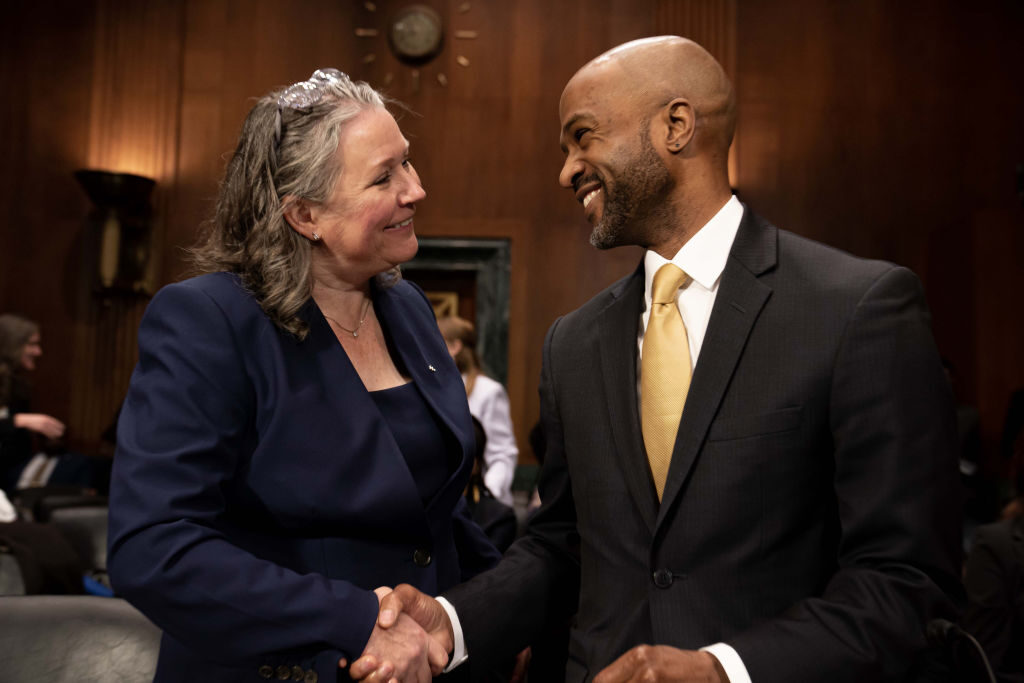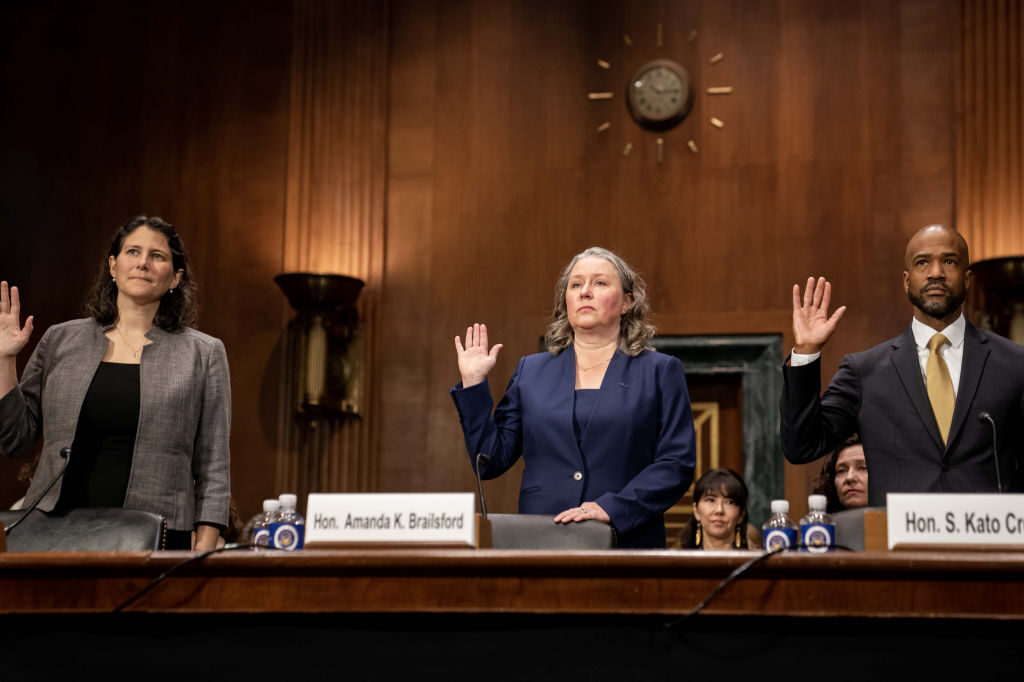
Biden Judicial Nominee Clueless on Due Process Rights
Joe Biden judicial nominee Kato Crews stumbled during his Senate confirmation hearing Wednesday, not knowing one of the most basic constitutional protections for citizens accused of crimes by their government, confusing it with Second Amendment rights, about which he likewise seemed confused.
WASHINGTON, DC – Joe Biden judicial nominee Kato Crews stumbled during his Senate confirmation hearing Wednesday, not knowing one of the most basic constitutional protections for citizens accused of crimes by their government, confusing it with Second Amendment rights, about which he likewise seemed confused.
Biden nominated Crews for a lifetime appointment as a trial judge on the U.S. District Court for the District of Colorado, where he currently serves as a federal magistrate. Previously he was a labor lawyer, making his nomination consistent with Biden’s understanding that big union bosses are the cornerstone of his political coalition and absolutely essential to his running for a second term.
Crews’ confirmation hearing before the Senate Judiciary Committee went off the rails when Sen. John Kennedy (R-LA) asked him, “Do you know what a Brady motion is?”
“It’s not coming to mind at the moment,” Crews responded. “I believe that the Brady case involved something regarding the Second Amendment.”
Crews’ answer is stunning. Brady v. Maryland is a watershed 1963 Supreme Court case which held that it violates the Due Process Clause of the Constitution – which is in both the Fifth and Fourteenth Amendments – when government prosecutors discover evidence that a suspected criminal is innocent, but do not provide a copy of that evidence to the suspect’s lawyer.

Amanda Brailsford, U.S. district judge for the district of Idaho nominee for U.S. President Joe Biden, left, and Kato Crews, U.S. district judge for the district of Colorado nominee for Biden, shake hands during a Senate Judiciary Committee nomination hearing in Washington, DC, US, on Wednesday, March 22, 2023. (Nathan Howard/Bloomberg via Getty)
That is a bedrock criminal procedural right, and the sort of question that recent law school graduates can expect to be on the bar exam to get their law license.
The principal behind Brady is that a primary purpose of the Constitution is to protect citizens against abuse by their own government, and that if prosecutors, with their enormous resources, come across evidence that a person is innocent of wrongdoing, fundamental fairness and justice demand a defense lawyer have full access to that information to bring to the court’s attention.
It is disturbing that any person who as a district judge would wield the power for the rest of his life to send Americans to prison would not know this basic constitutional protection. This becomes even more troubling because as a federal magistrate – who is like an assistant judge serving under a life-tenured district judge – Crews should have had the opportunity to learn about Brady motions, if he didn’t remember about them from law school.
Crews’ answer also raises an entirely separate issue as to why senators might doubt his qualifications to be a judge: not knowing the Second Amendment, which is another fundamental right.
Some constitutional provisions like the First Amendment have scores of Supreme Court cases, a couple dozen of which could be called major. While every American should want every judge to be thoroughly familiar with their First Amendment rights to free speech, freedom of religion, freedom of association, and so on, it is not surprising that a trial judge might not be able to rattle them off citing chapter and verse.
However, there have been only three significant Supreme Court regarding the Second Amendment in all of American history, and they are all recent: District of Columbia v. Heller (2008), McDonald v. Chicago (2010), and New York State Rifle & Pistol Association v. Bruen (2022).
And there are numerous cases involving Bruen in the courts at the moment, in the wake of Justice Clarence Thomas’ opinion where the court held that gun control laws are constitutional only if they are consistent with the historical public understanding of the Second Amendment’s “right to keep and bear arms.”

Molly Silfen, judge for the U.S. Court of Federal Claims nominee for U.S. President Joe Biden, from left, Amanda Brailsford, U.S. district judge for the district of Idaho nominee for Biden, and Kato Crews, U.S. district judge for the district of Colorado nominee for Biden, are sworn in during a Senate Judiciary Committee nomination hearing in Washington, DC, US, on Wednesday, March 22, 2023. ( Nathan Howard/Bloomberg via Getty)
Perhaps Crews confused Brady with Bruen because they sound similar, but that is like a person confusing football with baseball because they both contain the word “ball” or confusing steak with fried chicken because they’re both meat entrees. A person who would make mistakes like those would never be labeled an expert on sports or food, respectively.
This instance of Crews faceplanting on camera is just the latest incident of growing criticism about Biden and his White House picking judicial nominees who are regarded as young, far-left activists chosen for their passion to advance a leftwing view of the law instead of deep knowledge of the Constitution and the temperament to apply the law with fairness and impartiality. Other nominees are criticized because Biden and his team have openly bragged about picking some nominees because they are racial minorities or LGBT, rather than talking about their merits, pandering to different political constituencies to benefit Biden’s party.
The Crews episode brings to mind the hearing of Charnelle Bjelkengren, who did not know what was in Article I of the Constitution, which lays out all the powers of Congress and the issues on which federal laws can be passed, or Article II of the Constitution, which defines the powers and duties of the U.S. president.
The Senate Judiciary Committee has not yet scheduled a vote on the Crews nomination.


